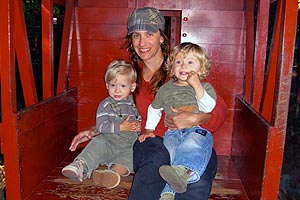 Amy Miller and the two year-old twins Devon and FelixIt’s been two years since my twins, Felix and Devon were born on July 27, 2007. In that time pretty much every mother with grown children has advised me to “enjoy it while you can” because this wondrous time will seem like it flew by. “They’ll never be babies again!” they say. “Good”, I reply.
Amy Miller and the two year-old twins Devon and FelixIt’s been two years since my twins, Felix and Devon were born on July 27, 2007. In that time pretty much every mother with grown children has advised me to “enjoy it while you can” because this wondrous time will seem like it flew by. “They’ll never be babies again!” they say. “Good”, I reply.
I wish I could say that the time has flown by but the fact is that the first year and a half were pretty challenging for us as first-time parents. Don’t get me wrong. I count my blessings every minute of every day. I have two beautiful, healthy, happy little boys. But it’s only been recently that Alex and I feel that we’ve found a rhythm with them and we’re starting to actually have fun. They are talking, singing, dancing, running and just recently, interacting and playing more with each other. They make us laugh all the time. Who knew that toddlers had such a sense of humor?
As a result of the QUEST story, my pregnancy became more of a public event than I expected it to be. Naturally, after the boys were born, there were several inquiries as to our well-being. Here’s what happened:
After lying in bed at California Pacific Medical Center in San Francisco for 30 days, I was very close to the end of my rope. Bed rest is infinitely more difficult that I could have ever imagined. When I was 34 weeks and 5 days pregnant, after an evening of crying to Alex that I couldn’t take much more of it, I decided to wind down and go to sleep. Normally, Alex would drive back to Oakland, where we lived at the time. But it was 1AM and even though he had to be at work at 6AM, he was too tired to go home. We asked a nurse to bring him a cot to sleep on in my room. Thank goodness we did. About 10 minutes after we turned off the lights, I felt my water break. If he’d gone back across the Bay Bridge, he would have missed the birth. We called the nurses and doctors and they decided to deliver the boys via caesarian section. Devon, or “baby A” as he was called at that time, was still breech and doctors will not deliver twins vaginally if the first baby is breech.
By 3:30AM, I had two little pink, wrinkly babies. Baby A was 4lbs. 12 oz., Baby B was 4 lbs., 6 oz. They stayed in the Neonatal Intensive Care Unit for 2 weeks then we took them home. They were perfectly healthy but just needed to gain a bit of weight and be able to keep their temperatures up without the help of an incubator. The rest, as they say, is history. They are now developing normally; growing and learning new things every hour, it seems. Life is good.

